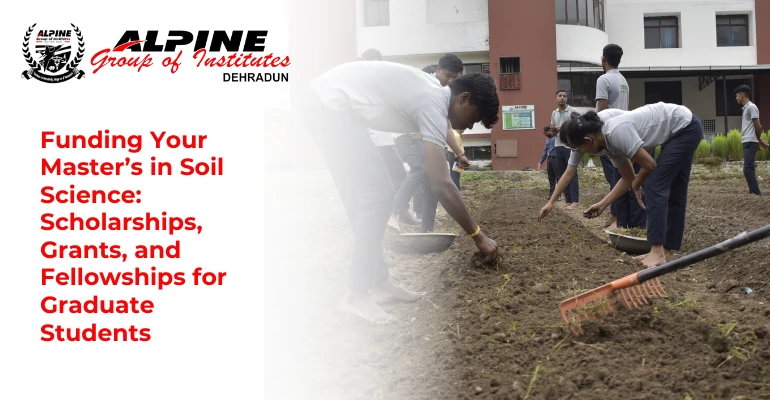Funding Your Master’s in Soil Science: Scholarships, Grants, and Fellowships for Graduate Students
2024-12-16 9:33Funding Your Master’s in Soil Science: Scholarships, Grants, and Fellowships for Graduate Students

Funding Your Master’s in Soil Science: Scholarships, Grants, and Fellowships for Graduate Students
Pursuing a Master’s in Soil Science is an exciting academic journey that equips you with the knowledge and skills to address pressing global challenges, such as soil degradation, climate change, and sustainable agriculture. However, like most graduate programs, financing your education can be a significant hurdle. Fortunately, there are a variety of funding opportunities specifically designed to help students in the field of soil science.
1. Scholarships for Soil Science Graduate Students
Scholarships are one of the most sought-after forms of financial assistance for graduate students. These awards do not need to be repaid, making them a great option for funding your education. Below are some scholarships that are specifically geared toward students pursuing soil science, environmental science, or related fields:
A) Indian Council of Agricultural Research (ICAR) Scholarships
The Indian Council of Agricultural Research (ICAR) is a key government body that provides scholarships and fellowships for students pursuing postgraduate studies in agriculture, including soil science.
ICAR Junior Research Fellowship (JRF)
- Eligibility: This fellowship is for students who have qualified the ICAR All India Entrance Examination for Admission (AIEEA) and are enrolled in Master’s programs in soil science, agriculture, or related fields.
- Benefits: The ICAR JRF provides a monthly stipend along with funding for research-related expenses, fieldwork, and other academic requirements.
- Application Process: Interested students can apply through the ICAR website after qualifying for the AIEEA.
ICAR Senior Research Fellowship (SRF)
- Eligibility: Available to students pursuing their Ph.D. in agricultural sciences, including soil science. Though this is primarily for doctoral students, some Master’s students who are involved in high-level research may be eligible for SRF funding.
- Benefits: SRF fellows receive a monthly stipend along with additional research allowances.
- Application Process: ICAR SRF is available through specific ICAR research projects or affiliated institutions.
B) State Agricultural Universities (SAUs) and Other Institutions
Many state agricultural universities in India provide scholarships, financial assistance, and research fellowships to students pursuing postgraduate degrees in soil science. Some prominent universities include:
- Punjab Agricultural University (PAU)
- Tamil Nadu Agricultural University (TNAU)
- University of Agricultural Sciences (UAS), Bangalore
- Acharya N.G. Ranga Agricultural University (ANGRAU)
These universities often offer:
- Merit-based Scholarships: Awarded to students with excellent academic records and strong research interests in soil science.
- Research Assistantships: Graduate students working on specific research projects in soil science may receive stipends and funding for fieldwork, lab work, and data collection.
Be sure to check with the admissions or financial aid office of the university where you plan to apply to find out about university-specific scholarships and funding opportunities.
C) National Fellowship for Agricultural Students (NFAS)
The National Fellowship for Agricultural Students (NFAS) is a government initiative that provides financial assistance to students from economically disadvantaged backgrounds.
- Eligibility: This fellowship is aimed at students from economically weaker sections (EWS) who are pursuing Master’s or Ph.D. degrees in agricultural sciences, including soil science.
- Benefits: The NFAS fellowship includes a stipend to cover tuition fees, living expenses, and research costs.
- Application Process: Students can apply for the NFAS through their respective agricultural universities or through the Ministry of Agriculture and Farmers’ Welfare.
- University Grants Commission (UGC) Fellowships and Scholarships
The University Grants Commission (UGC) offers various fellowships and scholarships for postgraduate students in India, including those pursuing advanced degrees in soil science and related fields.
UGC NET (National Eligibility Test) Junior Research Fellowship (JRF)
- Eligibility: Students who qualify for the UGC NET exam and are enrolled in postgraduate programs in soil science or related disciplines are eligible for this fellowship.
- Benefits: The JRF provides a stipend for living expenses as well as funds for research activities. It is designed to support students who intend to pursue academic careers or research in soil science.
- Application Process: Students must first appear for the UGC NET exam and meet the eligibility criteria. The fellowship is then awarded based on performance.
UGC Postgraduate Scholarship for Professional Courses
- Eligibility: This scholarship is open to students pursuing professional postgraduate courses, including those in agriculture and environmental sciences.
- Benefits: The scholarship covers tuition fees and may offer additional funds for research and fieldwork.
- Application Process: Applications can be submitted online through the UGC website or through the respective universities.
D) Private Sector Scholarships and Fellowships
Several private companies, NGOs, and foundations in India are investing in the future of agriculture and environmental sustainability by offering scholarships and fellowships for students pursuing Master’s degrees in soil science.
Tata Trusts Scholarships
- Eligibility: The Tata Trusts offer scholarships and fellowships to students pursuing postgraduate studies in areas like soil science, agricultural sustainability, and environmental science.
- Benefits: The scholarship provides funding for tuition fees, living expenses, and research projects.
- Application Process: Interested students can apply through the Tata Trusts website. Selection is based on academic merit and financial need.
BASF India Scholarships
- Eligibility: BASF, a multinational chemical company, supports students pursuing degrees in agricultural sciences, including soil science, by providing scholarships and research grants.
- Benefits: The scholarship covers tuition fees and offers a stipend for living expenses and research activities.
- Application Process: Applications can typically be submitted directly on BASF’s website or through partner institutions.
E) Corporate and NGO Grants
Several NGOs and corporate foundations in India are dedicated to supporting environmental research and agricultural development. These organizations often fund projects related to soil conservation, sustainable land use, and ecosystem restoration. Some examples include:
- Indian Farmers Fertiliser Cooperative (IFFCO): IFFCO offers scholarships and fellowships for students pursuing agricultural studies, including soil science.
- The Energy and Resources Institute (TERI): TERI provides fellowships for students researching sustainability, soil health, and climate change. TERI’s Young Researchers Fellowship may be an option for students interested in environmental research.
- Pradhan Mantri Krishi Sinchayee Yojana (PMKSY): This government initiative, though focused on irrigation, offers scholarships and research grants for students working on agricultural water management, which is closely linked to soil science.
2. Research Grants for Soil Science Students
Research grants are another valuable funding source for students, particularly those who want to conduct original research as part of their Master’s program. Many organizations offer grants that support soil science research, and these can sometimes be tied to specific research projects or broader environmental goals.
a) U.S. Department of Agriculture (USDA) Research Grants
The USDA offers a range of funding opportunities for students conducting research on topics like soil health, agriculture, and climate change. Specific programs to look for include:
- USDA-NIFA Predoctoral Fellowship: Although more commonly associated with doctoral studies, some Master’s students in soil science may be eligible for predoctoral fellowships that support research in soil fertility, sustainable agriculture, and land management.
- Sustainable Agriculture Research and Education (SARE) Grants: This program supports research on sustainable farming practices, including soil health and conservation, and could fund graduate research projects focused on these areas.
b) International Research Grants
For students planning to study or conduct research abroad, there are various international funding opportunities:
- The World Bank and United Nations Environment Programme (UNEP): These organizations fund projects aimed at improving soil health, combating desertification, and promoting sustainable land management practices around the world.
- Research Grants from Global Environmental Organizations: Organizations like the Global Soil Partnership (GSP) and the International Union of Soil Sciences (IUSS) often offer research funding for projects focused on global soil challenges.
c) University-Specific Research Grants
Many universities have internal funding opportunities for graduate students, including competitive research grants and project-specific funding. It’s a good idea to inquire about such opportunities directly with your university’s soil science or environmental science department, as they may have partnerships with industry or government agencies that provide additional funding for specific research topics.
3. Fellowships for Soil Science Graduate Students
Fellowships are another excellent source of funding for graduate students, especially for those who want to engage in independent research or need financial support for their academic journey. Fellowships often provide funding for both tuition and living expenses and can last for the duration of your studies.
a) The Global Soil Partnership (GSP) Fellowships
The GSP, an initiative supported by the Food and Agriculture Organization of the United Nations (FAO), often provides fellowships for soil science graduate students focusing on international soil health issues, land management, and environmental sustainability.
b) The American Association of University Women (AAUW) Fellowships
The AAUW offers fellowships and grants to women pursuing graduate degrees in various fields, including environmental sciences and soil science. This is an excellent opportunity for female students interested in advancing in a male-dominated field like soil science.
c) National Geographic Society Grants and Fellowships
National Geographic provides a variety of grants and fellowships that support students and professionals conducting research in environmental science, including soil and ecosystem health. Their grants often focus on global sustainability, biodiversity, and land management, all of which are highly relevant to soil science research.
d) Environmental Protection Agency (EPA) Fellowship Program
The EPA offers fellowships and funding for graduate students conducting research related to environmental science and policy, including soil contamination, pollution, and sustainable land use. Their funding often supports research that aligns with the agency’s mission of protecting human health and the environment.
Tips for Securing Funding for Your Master’s in Soil Science
Securing funding for your Master’s in Soil Science may seem daunting, but there are steps you can take to maximize your chances of success:
a) Start Early and Plan Ahead
Many scholarships, grants, and fellowships have early application deadlines, sometimes as much as a year before the start of your program. Make a timeline and start researching opportunities well in advance to ensure you don’t miss out on any funding options.
b) Apply to Multiple Funding Sources
The more funding opportunities you apply for, the higher your chances of securing financial support. Look for a combination of scholarships, research grants, and fellowships that can cover your tuition and living expenses.
c) Tailor Your Application to Each Opportunity
Each funding source will have its own set of eligibility criteria, and many require you to submit a personal statement or research proposal. Take the time to tailor your application to the specific requirements of each scholarship or grant, and make sure to highlight your interest in soil science, your academic achievements, and any relevant research experience.
d) Seek Mentorship and Support
Reach out to faculty members or advisors within your soil science program. They often have valuable insights into funding opportunities and can help guide you through the application process. Many professors have research grants that could fund your thesis work or may be willing to serve as mentors for fellowship applications.
Conclusion
Funding a Master’s in Soil Science can seem like a challenging task, but there are numerous scholarships, grants, and fellowships available to help you pursue your academic and professional goals. Whether you are looking for merit-based scholarships, research grants for specific projects, or fellowships that support long-term study, there are many financial resources to support your journey.
By starting early, applying to multiple funding sources, and tailoring your applications to highlight your skills and research interests, you can secure the financial support you need to focus on your studies and make a lasting impact in the field of soil science. Take the time to explore all the available opportunities, and don’t hesitate to seek help from your academic mentors. Your passion for soil science, combined with the right financial support, can lead to a successful and fulfilling career dedicated to solving some of the world’s most critical environmental challenges.





